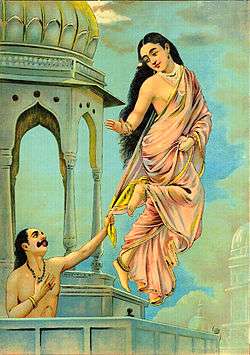Urvashi
| Urvashi | |
|---|---|
 Urvashi and Pururavas painted by Raja Ravi Varma | |
| Information | |
| Children |
Rishyasringa from Vibhandaka Ayu from king Pururavas |
Urvashi (Sanskrit: उर्वशी, lit. she who can control heart of others. ("Ur" means heart and "vash" means to control) is an Apsara (nymph) in Hindu legend. Monier Monier-Williams proposes a different etymology in which the name means 'widely pervasive' and suggests that in its first appearances in Vedic texts it is a name for the dawn goddess. She was a celestial maiden in Indra's court and was considered the most beautiful of all the Apsaras.
She is mother of Rishyasringa great saint of the Ramayan era of ancient India from Vibhandaka who later played crucial role in birth of Rama and was married to Shanta elder sister of Ram.
She became the wife of king Pururavas (Purūrávas, from purū+rávas "crying much or loudly"), an ancient chief of the lunar race. ShBr 11.5.1, and treated in Kalidasa's drama Vikramōrvaśīyam.
She is perennially youthful and infinitely charming but always elusive.[1] She is a source as much of delight as of dolour.[2]
Birth

There are many legends about the birth of Urvashi but the following one is most prevalent.
Once the revered sages Nara-narayana was meditating in the holy shrine of Badrinath Temple situated in the Himalayas. Indra, the king of the Gods, did not want the sage to acquire divine powers through meditation and sent two apsaras to distract him. The sage struck his thigh and created a woman so beautiful that Indra’s apsaras were left matchless. This was Urvashi, named from ur, the Sanskrit word for thigh. After his meditation was complete the sage gifted Urvashi to Indra, and she occupied the pride of place in Indra’s court.
See also
References
- A Dictionary of Hindu Mythology & Religion by John Dowson
- ↑ George (ed.), K.M. (1992). Modern Indian Literature, an Anthology. Sahitya Akademi. ISBN 978-81-7201-324-0.
- ↑ George (ed.), K.M. (1992). Modern Indian Literature, an Anthology. Sahitya Akademi. ISBN 978-81-7201-324-0.
